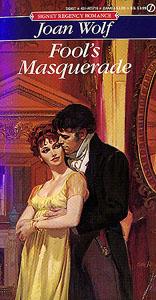

However, Valentine refuses to marry him since he does not love her and flees to her grandparents and a spectacular London season. His subsequent pursuit of her, predictably fraught with plot confusions, makes up Part 2 of the novel. Once again the conclusion is anticipated by the heading quotation: " Your master quits you; and for your service done him, /So much against the mettle of your sex,/ So far beneath your soft and tender breeding/ And since you called me master for so long/ Here is my hand: you shall from this time be/ Your master's mistress" (TN 5.1.341-47; Fool's Masquerade 125). Although all of Wolf's chapter heading quotations in earlier novels do apply to the content of chapters, the Twelfth Night references at the beginning of these two parts have more extended influence and reference throughout the plot, which in its own way works through the difficulties of both Valentine's love for Diccon from within her disguise and, perhaps more significantly, through Diccon's extended discovery that his proposal to her was more than just the honorable correction of her compromised position as an unchaperoned female within his household.
In this elaboration of the romantic union of Viola and Orsino from Twelfth Night, Wolf's strategies resemble Michelle Martin's in The Hampshire Hoyden--she adopts the Shakespearean romantic plot but plays out the unconvincing denouement of Orsino's abrupt claiming of Viola. The extended confusions and miscommunications of the second half give Diccon the opportunity to discover his love for the woman he has ordered to marry him every bit as abruptly as Orsino claims Viola. Had she researched the nineteenth century responses to Orsino's abrupt reversal, Wolf could not have done a more thorough job of developing both Diccon's attractiveness for his female page and his attraction to her. Of course, no real Olivia mars the landscape of Wolf's novel and Diccon is about as far from lovelorn and inactive as he can be, despite his love of music.
Go to Introduction References by Play Return to Shakespeare Quoters
